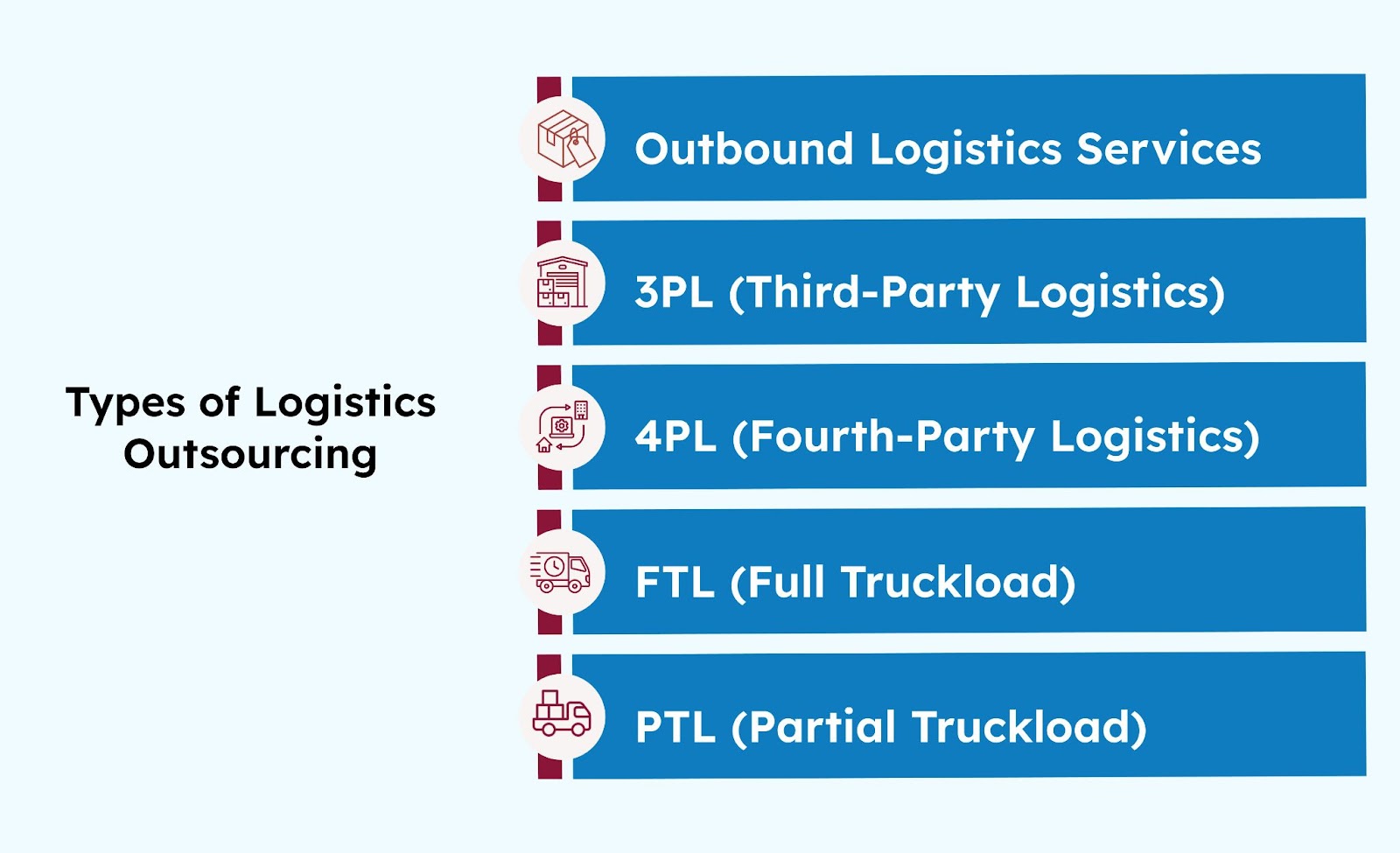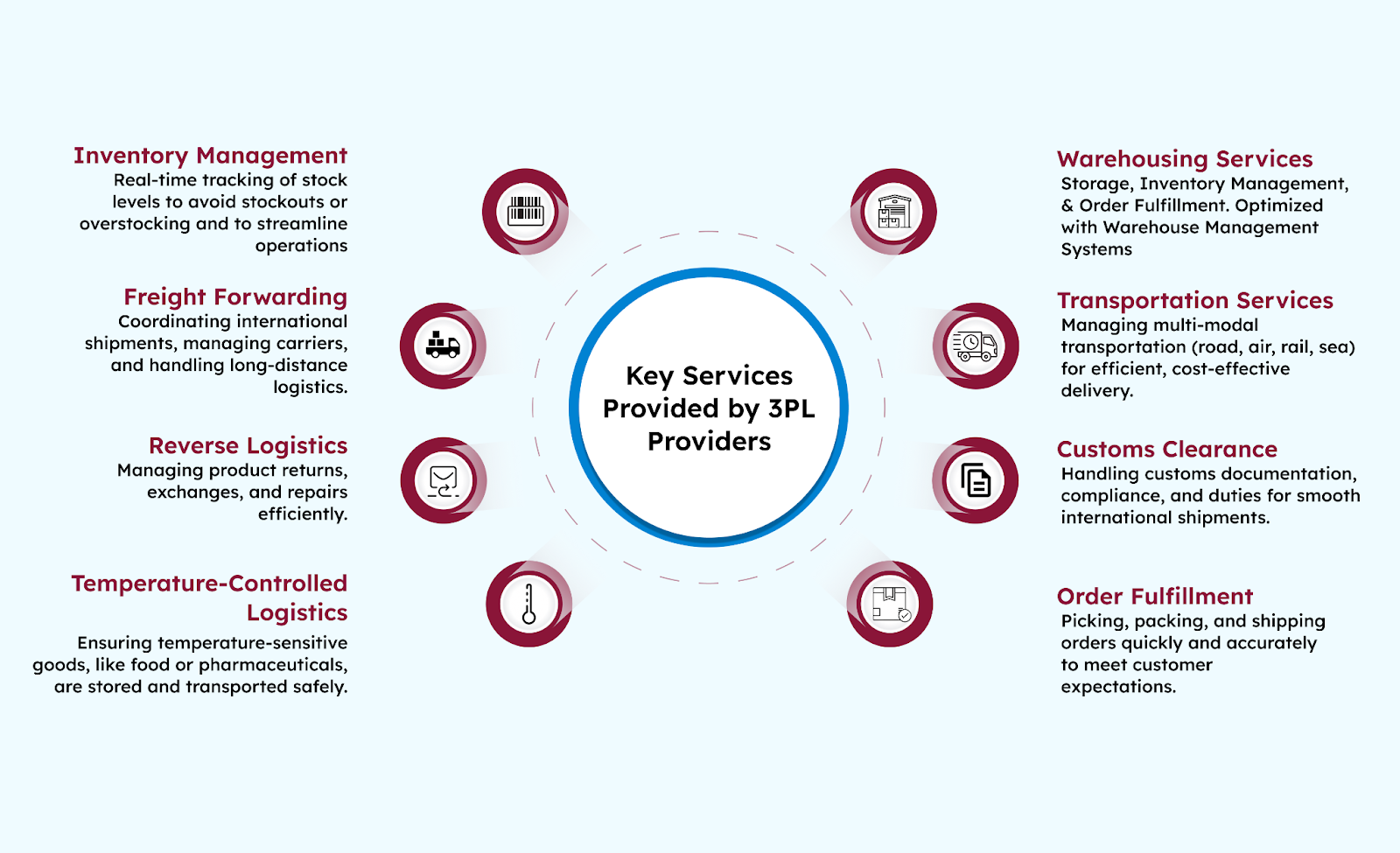The logistics outsourcing market has seen significant growth in recent years. In 2023, the global logistics outsourcing market was valued at approximately $63 billion, and it's expected to grow to $79 billion by 2028. As businesses scale, managing logistics internally becomes increasingly challenging.
A recent survey found that 29% of businesses struggle with delayed deliveries and inventory shortages, which directly impact their ability to meet customer demand. Outsourcing logistics to third-party providers (3PLs) allows businesses to streamline their operations, reduce costs, and enhance service delivery.
By entrusting warehousing, transportation, and order fulfilment to experts, companies can focus on their core competencies while ensuring that logistics processes are handled efficiently and effectively.
In this article, we’ll explore why outsourced logistics services are becoming essential for many businesses, how they can boost efficiency, and the advantages of relying on external experts to manage your logistics needs.
What Are Outsourcing Logistics Services?
Outsourced logistics involves hiring a third-party provider to handle key logistics functions that are essential to your business but not part of your core operations. This approach allows you to focus on what you do best while leaving the logistics to experts.
The services typically outsourced include:
- Warehousing: Storing inventory in strategic locations to reduce shipping times and costs.
- Transportation: Managing the shipping of goods from the warehouse to customers, ensuring timely delivery.
Order Fulfilment: Handling the picking, packing, and shipment preparation of orders. - Inventory Management: Monitoring stock levels to ensure products are always available without overstocking.
A key player in outsourced logistics is the Third-Party Logistics (3PL) Provider. These companies specialise in managing some or all of the logistics processes. Whether it’s storing goods, handling shipments, or tracking inventory, 3PL providers take care of these tasks, allowing businesses to focus on their main operations.
With a clearer understanding of logistics outsourcing, it’s important to recognise the various types of logistics outsourcing available today. Let’s break down the key options that businesses are increasingly relying on.
Types of Logistics Outsourcing

1. Outbound Logistics Services
Outbound logistics refers to the process of moving finished goods from the point of production to the final consumer or retailer. This type of logistics involves activities like order fulfilment, shipping, distribution, and delivery.
- Key Responsibilities: Packaging, inventory management, order processing, and delivery management.
- Benefits: Helps businesses manage the entire shipping process, ensuring timely and accurate delivery to customers.
2. 3PL (Third-Party Logistics)
3PL providers are third-party companies that manage a wide range of logistics functions, from warehousing and transportation to order fulfilment and distribution. Businesses use 3PL services to outsource these operations and focus on their core activities.
- Services Offered: Warehousing, inventory management, order fulfilment, transportation, shipping, and customs clearance.
- Benefits: Cost savings, scalability, and access to expert logistics technology. Businesses don’t need to invest in infrastructure or technology, as 3PLs already have the systems in place.
3. 4PL (Fourth-Party Logistics)
4PL providers go a step further than 3PLs by managing the entire supply chain. They often coordinate the services of multiple 3PL providers and handle end-to-end logistics operations.
- Key Role: Supply chain optimisation, strategic planning, and coordination. 4PLs don’t just perform logistics functions; they manage the logistics process, provide consulting, and integrate technologies across the supply chain.
- Benefits: Comprehensive supply chain management, improved visibility and efficiency, and the ability to outsource all logistics operations to a single provider. 4PLs often provide tailored solutions based on your business’s needs.
4. FTL (Full Truckload)
FTL refers to a logistics service where a company hires an entire truck to transport goods. This is typically used when the shipment is large enough to fill a truck or when businesses prefer to have exclusive use of a vehicle for faster and more direct delivery.
- Key Feature: Exclusive use of the truck for a single shipment, reducing the need for shared space.
- Benefits: Faster transit times, direct delivery to the destination without stopping for other deliveries, and greater security for high-value goods.
5. PTL (Partial Truckload)
PTL is a logistics service where businesses share a truck with other shipments. It’s a cost-effective option for smaller shipments that don’t require the full capacity of a truck.
- Key Feature: Shared transportation space with other shipments, reducing transportation costs for smaller loads.
- Benefits: Lower costs compared to FTL, while still getting the benefits of dedicated truck delivery. Ideal for businesses with medium-sized shipments or irregular shipping needs.
As we’ve seen, logistics outsourcing comes in different forms. Let’s take a closer look at what 3PL providers offer to help businesses optimise their logistics processes and improve operational efficiency.
What Services Do 3PL Providers Offer?
3PL providers offer a comprehensive range of services to manage logistics operations effectively. According to recent data, 63.5% of shippers are outsourcing their warehousing activities to 3PL providers. These services include:

- Warehousing Services: 3PL providers offer warehousing solutions, including storage, inventory management, and order fulfilment. Warehouses are strategically located to ensure quick distribution and efficient storage of goods. Providers typically use advanced Warehouse Management Systems (WMS) to optimise space, track stock, and ensure goods are picked and packed efficiently.
- Transportation Services: 3PL providers manage the transportation of goods from warehouses to customers, coordinating various methods such as road, air, rail, or sea. They help optimise routes, manage shipping schedules, and ensure timely delivery while controlling costs. Some 3PLs also specialise in last-mile delivery, focusing on the final step in the delivery process to the customer’s doorstep.
- Customs Clearance: For businesses involved in international trade, customs clearance is a crucial service provided by many 3PLs. This includes handling all customs documentation, ensuring compliance with local regulations, and managing the payment of duties and taxes. WareOne simplifies this process, helping businesses efficiently manage customs requirements and ensuring smooth passage of goods through borders.
- Order Fulfilment: 3PLs manage the entire order fulfilment process, from picking and packing products to shipping them out. This is especially important for businesses that need to deliver goods quickly and accurately to customers. Outsourcing this service helps businesses meet customer expectations for fast delivery and reduces internal logistics complexity.
- Inventory Management: Efficient inventory management is critical for businesses. 3PL providers help track stock levels, ensure the right products are available, and minimise the risk of stockouts or overstocking. By using real-time tracking and advanced systems, 3PLs ensure smooth inventory turnover and optimise stock levels.
- Freight Forwarding: 3PLs can manage freight forwarding services, which include the coordination of international shipments and handling all aspects of moving goods across borders. This includes selecting carriers, consolidating shipments, and managing the logistics of long-distance transportation.
- Reverse Logistics: 3PL providers also handle reverse logistics, which includes processing returns, exchanges, and repairs. This is particularly useful for e-commerce businesses that deal with frequent product returns, as the 3PL manages the logistics to bring returned items back into the warehouse and determine whether they need to be restocked or disposed of.
- Temperature-Controlled Logistics: For industries like pharmaceuticals or food, 3PL providers offer temperature-controlled logistics, ensuring that goods are stored and transported under the required conditions to maintain their quality and compliance.
By outsourcing these tasks to specialised 3PL providers, businesses can focus more on their core functions while relying on experts to manage their logistics needs.
Importance of Outsourcing Logistics
Managing logistics in-house can be overwhelming. The costs can quickly add up, making it challenging to stay on top of everything, whether it's warehousing, transportation, or tracking inventory. Outsourcing logistics to third-party providers (3PLs) helps solve these challenges by:
- Cutting Costs: Outsourcing means you don’t have to invest in warehouses, staff, or vehicles. You only pay for what you need, keeping expenses predictable and manageable.
- Expertise at Your Fingertips: 3PLs bring in the know-how and technology to handle complex logistics tasks, like inventory management and delivery optimisation, without the learning curve or investment from your side.
- Flexibility to Scale: Whether it’s during busy seasons or when expanding to new markets, outsourcing lets you quickly adjust your logistics without needing extra resources or infrastructure.
- Better Customer Experience: By using 3PL services, you can offer faster, more reliable deliveries, helping to keep your customers happy and build loyalty.
Outsourcing logistics lets you focus on what you do best while leaving the rest to the experts, making your operations smoother and more cost-effective. While outsourcing logistics offers numerous benefits, it’s crucial to choose the right partner. Now, let’s explore key factors to consider when evaluating potential logistics providers to ensure a seamless partnership.
What to Look for in an Outsourced Logistics Partner
While outsourcing logistics offers many benefits, it’s not without its challenges. Before making the move, consider the following:
- A provider with industry-specific knowledge will understand your unique needs, regulatory requirements, and operational challenges.
- Choose a partner who can scale with you and adjust to fluctuations in demand, seasonal peaks, or sudden changes in product offerings without compromising service levels.
- Look for a logistics provider that offers real-time tracking of shipments and inventory.
- Ensure that the provider offers competitive pricing with flexible payment models like pay-per-use or volume-based pricing, allowing you to optimise your costs based on actual usage rather than fixed fees.
- A strong logistics partner will leverage the latest technology, such as Warehouse Management Systems (WMS), RFID tracking, and automated inventory systems, to streamline operations, reduce errors, and provide seamless integration.
Let’s see how WareOne can help you tap into these benefits with tailored logistics solutions built around your unique needs.
How WareOne Can Help You Optimise Logistics
At WareOne, we specialise in providing outsourced logistics services that are flexible, scalable, and tailored to your business needs. Here’s how we can help:
- Flexible Warehousing: Pay only for the space you use, ensuring you don’t overcommit resources. This flexibility helps you scale up or down based on business demand.
- Scalable Solutions: Whether you need one delivery truck or an entire fleet, we provide solutions that grow with your business. We offer a broad range of services, from last-mile delivery to long-haul transportation.
- Real-Time Monitoring: Track shipments and inventory in real time, giving you full visibility into your logistics operations. Our advanced technology platform enables you to monitor your goods throughout the entire supply chain, ensuring timely and accurate deliveries.
- Cost-Effective Pricing: We offer dynamic pricing based on actual usage, so you only pay for what you need, when you need it. With our flexible pricing model, you avoid hidden fees and unnecessary overhead costs.
- Integrated Customs Clearance: Our customs clearance services streamline the process, ensuring your goods pass through borders with minimal delays. As your Importer of Record (IOR), we manage all necessary documentation, taxes, and compliance requirements, so you can focus on scaling your business.
- E-commerce Fulfilment Services: As a one-stop shop for logistics, WareOne provides complete e-commerce fulfilment solutions. From warehousing and order picking to packaging, shipping, and returns management, we handle the entire process seamlessly, helping you deliver a smooth customer experience.
Partnering with WareOne gives you access to expert logistics services, freeing up your time and resources so you can focus on what truly matters: growing your business.
Wrapping Up
Outsourcing logistics services helps businesses reduce costs, improve efficiency, and focus on core operations. By partnering with the right 3PL provider, companies can enhance delivery speed, scalability, and customer satisfaction.
At WareOne, we offer flexible, scalable logistics solutions tailored to your business needs. With real-time tracking, cost-effective pricing, and expert support, we help you optimise your logistics and stay competitive. Our proven strategies drive efficiency and ensure faster, reliable delivery to meet rising customer expectations. Reach out to WareOne today and discover how we can streamline your logistics for better results.
.jpg)